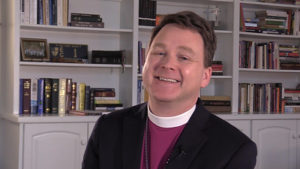Below are several links to documents describing benefits of the various medical, dental, disability, life insurance, and retirement savings plans available to clergy and eligible lay employees of the Episcopal Church in Delaware.
These are benefits each church has access to, but each church has a choice about whether or not to provide some of them, e.g. life insurance, short-term disability, long-term disability.
The General Convention requirements around Lay Pension Plans and Medical Benefits have some requirements.
Many benefits listed below are offered under the umbrella of the Church Pension Group.
All eligible active clergy employees enroll in one of three medical insurance plans. The 2023 Diocesan Base Plans will be the Anthem BCBS Blue Card PPO 80 and the Anthem BCBS CDHP *20/HSA (Consumer driven health plan coupled with a Health Savings Account – HSA). The Insurance Committee of the Diocesan Council believes that these two plans, though different, are comparable. The third and fourth plans are the Anthem BCBS Blue Card PPO 90 Plan and the BDBS Blue Care PPO 100 Plan, as premium sharing plans. The MS Anthem Blue Card PPO 80 and MS Anthem Blue Card PPO 90 Plans will be offered for those eligible for Medicare, enrolled in Part A, and are employed by an employer with under 20 employees.
All plans provide (Express Scripts), mental health (Anthem), and eye-care (Eye-Med) benefits. Eligible employees sign up for these plans at the time of employment or during the open enrollment periods that occur in the fall. Please see APPENDIX B of the Active Clergy Guide for current rates.
Health Benefit Handbooks can be opened at the following links:
- 2023 Anthem BlueCard PPO80
- 2023 Anthem BlueCard PPO90
- 2023 Anthem BlueCard PPO 100
- 2023 Anthem BlueCard CDHP *20/HSA
- Anthem BCBS Handbook
Employees who are 65 years old, eligible for Medicare, employed by an eligible small employer, and are covered by a plan sponsored by The Episcopal Church Medical Trust may enroll in a Medicare Secondary Payer (MSP). MSP is the term used when Medicare is not the primary payer of your medical claims. Medicare allows for an exception to the MSP. A small employer may request that Medicare serves as the primary payer for eligible Medicare beneficiaries by seeking a “small employer exception.” When Medicare becomes the primary payer of medical claims, the cost of providing medical coverage will be lower because your health plan through The Medical Trust becomes the secondary payer. The reduction in cost may reduce premiums compared to plans in which Medicare is not the primary payer. An employee’s out-of-pocket medical costs may be lower, too. For an employee or their eligible dependent(s) to be approved for these plans, they must first be enrolled in Medicare Part A (hospital insurance). Refer to the Member Fact Sheet. Please contact the business manager for additional information.
Under the terms of the DHP, clergy and lay employees who have medical benefits through approved sources will be allowed to waive medical coverage under the DHP (“opt out”) and choose to maintain their medical benefits through the approved source. Examples of approved sources include coverage through a spouse’s or partner’s employment, medical benefits through a government-sponsored program such as Medicaid or TRICARE, or coverage from a previous employer. The list of approved sources is subject to change based on the federal healthcare reform law. An employee may elect to waive coverage at the initial point of employment, during annual open enrollment, or at the time of any significant life event. The employee will need to reaffirm the election to waive coverage on an annual basis, as determined by the Medical Trust.
If a spouse has coverage under the plan with their place of employment, children are covered under the most beneficial plan.
The diocese provides access to three dental plans provided and administered by Cigna Dental through The Medical Trust. The Standard Plan is the Basic Dental Plan. The Dental and Orthodontia Plan is an optional buy-up plan, and the Preventive Dental plan is a lower cost option which can also be chosen.
Hearing Benefits are available through the Amplifon Hearing Health Care network.
- Short-Term Disability — The Income Replacement Plan helps an employee with maintaining income should the employee become disabled. All clergy persons who meet the following criteria are automatically receiving this benefit : 1) actively working in an Episcopal organization, 2) canonically resident in the US, and 3) pension payments are current.
- Long-Term Disability — Full time, active participants in the clergy pension plan also receive a disability retirement benefit for total, continuing disability that renders them unable to work through the Church Pension Group.
These benefits for lay employees are currently under review and will be posted at a later time.
Clergy Life Insurance – Church Pension Group. If you are an active member of The Church Pension Fund, you have a Group Term Life Insurance benefit equal to four times your total compensation to a maximum of $100,000. You also have an additional $25,000 of Group Term Life Insurance paid for by the congregation you serve.
- Life Insurance Beneficiary Designation For (Clergy only)
- Health Statement Form for Group Life (Clergy only)
These benefits for lay employees are currently under review and will be posted at a later time.
Clergy: Canon law requires your church employer to pay pension assessments to the Church Pension Fund. The fund’s Board of Trustees has set the assessment rate at 18% of your annual compensation package. Thus, as an active participant in the Church Pension Fund, you share in a comprehensive plan for financial security throughout your ministry and into retirement. As you plan for your future, your pension plan offers flexibility and the comfort of knowing that once you retire, you are assured of your full benefits throughout retirement.
- Report of Change in Compensation — for clergy only, relating to their pensions.
Lay Employees: Our Defined Benefit Plan assures participating employees a base pension benefit throughout retirement. The amount of the benefit is determined at the time of retirement and will not decrease. Your employer makes contributions based on 9% of your salary.
- Defined Benefit Plan Details
- You may add to your retirement savings with the Retirement Savings Plan, a 403(b) investment vehicle.
Our retirement savings plan is through the Church Pension Group. The RSVP lets you save for retirement in a tax-effective way. This flexible savings plan allows both pre-tax and after-tax contributions. In 2023, you may contribute up to $22,500 before taxes if you are under age 50, and an additional $7,500 if you are 50 or older. The total that you and your employer may contribute may not exceed 100% of your salary or $66,000 or $73,500 if you are 50 years or older. Your investment grows tax-deferred until the money is withdrawn, usually after age 59-1/2.
The diocese offers a Flexible Spending Account (FSA) through Paychex, Inc. An FSA is a pretax benefit allowable under Internal Revenue Code Section 125. The plan allows eligible employees to set aside a specific pre-tax dollar amount for unreimbursed medical, dental, vision, over-the-counter items, and dependent care expenses. Since FSA deductions come out of your paycheck as a pre-tax benefit, less wages are taxed, resulting in more take-home pay for you. Regular payroll deductions help you budget medical, dental, vision, over-the-counter, and dependent care expenses.
Many of the documents here are in PDF format. If your computer doesn’t have the free Adobe Acrobat PDF Reader, click here to download and install Adobe Reader.
If you have any question about employee benefits not answered by the documents listed above, please contact:
- Teri Quinn Gray, Chief Operating Officer
The Episcopal Church in Delaware
913 Wilson Road
Wilmington, DE 19803-4012
(302) 256-0374 ext. 108 or tgray@delaware.church





